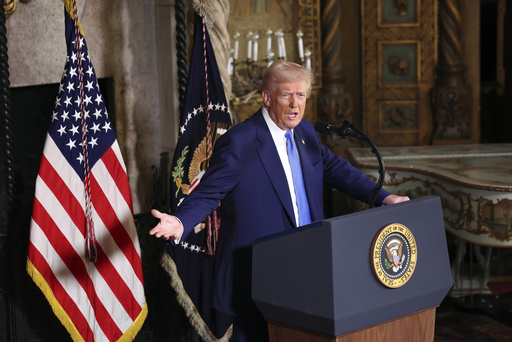The Trump administration has officially classified eight criminal organizations from Latin America as “foreign terrorist organizations,” intensifying its strategy against drug cartels operating within the United States and individuals aiding these groups. This designation follows up on an executive order issued by President Donald Trump on January 20 and will be documented in the Federal Register on Thursday, as stated in a notice released on Wednesday.
Among those named are Tren de Aragua in Venezuela and the notorious MS-13 from El Salvador, along with six criminal groups from Mexico. Trump’s approach to securing the U.S.-Mexico border has been a key focus of his administration, with pledges to implement mass deportations, deploy active military forces to the border, and negotiate agreements with certain nations to accommodate more migrants.
Labeling these organizations as “foreign terrorist organizations” is noteworthy, as it typically pertains to groups like al-Qaida or ISIS, which utilize violence for political motives rather than purely for financial gain through criminal activities as is the case with the Latin American cartels. The administration contends that the extensive international operations affiliated with these groups, involving drug trafficking and human smuggling, justify this classification.
However, critics argue that this broad designation may inadvertently harm diplomatic ties and disrupt trade relations with Latin American countries. Businesses and financial institutions may become apprehensive about possible U.S. legal actions should any of their transactions whatsoever tangentially relate to the cartels.
These cartels have infiltrated various sectors of Mexico’s economy, engaging not only in drug trafficking and human smuggling but also competing for dominance in lucrative markets such as the multibillion-dollar avocado industry. Aid organizations have voiced concerns, noting that previous U.S. designations of organizations as foreign terrorist entities have adversely affected overall food imports into certain countries, creating hesitancy among shipping companies about potentially facing U.S. legal consequences by being linked to the designated groups.
Mexican President Claudia Sheinbaum commented on the pending designations before they were formally announced, asserting that any decree linked to extraterritorial actions in Mexico would not be accepted. Nonetheless, she emphasized Mexico’s commitment to cooperating on enhancing joint investigations. She stated, “If they make this decree to investigate even more in the United States the money laundering and the criminal groups that operate in the United States and carry out those drug sales, it’s very good. What we do not accept is the violation of our sovereignty.”
Throughout his presidency, Trump has targeted specific organizations, particularly MS-13 and Tren de Aragua, using them to illustrate the perceived threats associated with immigration. U.S. authorities have indicated that Tren de Aragua represents a growing threat in multiple U.S. cities, while Trump and his proponents have held the gang up as a prime example of risks posed by migrants. MS-13, which originated in Los Angeles in the 1980s within communities of Salvadoran civil war refugees, has developed a notorious reputation based on its brutal violence and street-level drug activities.
The six cartel organizations identified in the terrorist designation from Mexico include the Sinaloa cartel, recognized as the country’s oldest criminal organization involved in drug, weapon, and human trafficking. In recent times, Sinaloa has seen substantial profits from manufacturing fentanyl, which is associated with tens of thousands of accidental overdose fatalities in the U.S. The cartel sources precursor chemicals from China, produces the drug, and smuggles it over the border.
Additionally, the other Mexican cartels designated as terrorist organizations include Jalisco New Generation, Gulf, Northeast, La Nueva Familia Michoacana, and United, broadening the scope of the administration’s response to organized crime in the region.




